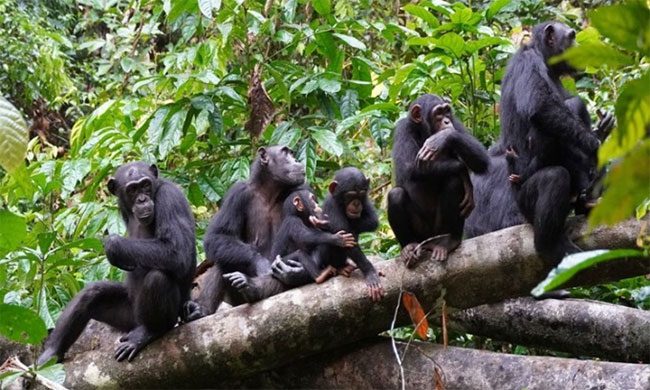Scientists have discovered that chimpanzees in Côte d’Ivoire monitor each other to avoid or escalate conflicts, much like humans do.
Chimpanzees employ an ancient military strategy to make decisions and avoid deadly conflicts with rival groups, according to research published in the journal PLOS Biology. Researchers found that two groups of western chimpanzees (Pan troglodytes verus) in Africa climb hills to observe one another, similar to reconnaissance missions in the military. They then use the information gained to decide whether to enter contested territory, Live Science reported on November 10.

Chimpanzees climbing hills to observe rival groups. (Photo: Reuters).
Many animals are cautious of dangers in their habitats, but this is the first time scientists have observed a non-human species meticulously using elevated terrain to assess risks in territorial conflicts. “This demonstrates the ability to perceive and act based on unknowns to gather more information,” remarked lead researcher Sylvain Lemoine, an associate professor of biological anthropology at the University of Cambridge.
Utilizing high ground is one of humanity’s oldest military strategies in warfare, according to the research team at the University of Cambridge. Chimpanzees live in groups that compete for land and resources. Their typical behavior includes coordinated attacks, sometimes resulting in fatalities. Territories between chimpanzee groups are not marked with stones, and their daily presence in a given area is crucial.
The new study monitored two neighboring chimpanzee groups as part of the Taï Chimpanzee Project, a conservation initiative in Taï National Park in Côte d’Ivoire. The research team, along with students and local assistants, followed the chimpanzees for 8 to 12 hours a day from 2013 to 2016, collecting behavioral and GPS data.
The data showed that chimpanzees were more likely to climb higher hills when moving towards their territorial boundaries. While on the hill, they sat quietly instead of engaging in activities that could hinder their ability to listen. The chimpanzees in the study could easily move from high ground to contested territory when rivals were far away, demonstrating that they used the hill to avoid conflict. However, they could also leverage high terrain to find opportunities for attack. Lemoine noted that when members of the two groups encountered each other, the balance of power (i.e., the number of individuals on each side) was a crucial factor determining whether violence would escalate on one side.
Lemoine and colleagues’ research only examined chimpanzees in Taï National Park, but they believe that other chimpanzees also use similar tactics, depending on the terrain. The complex cognitive abilities that help chimpanzees expand their territories are driven by natural selection, demonstrating that these fighting strategies have evolutionary origins.


















































